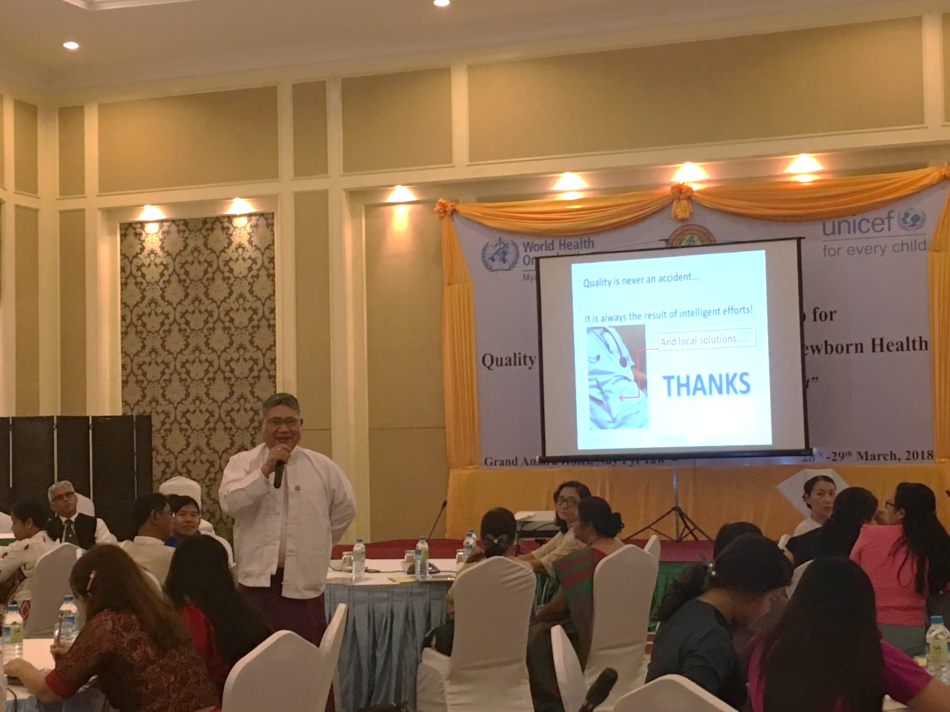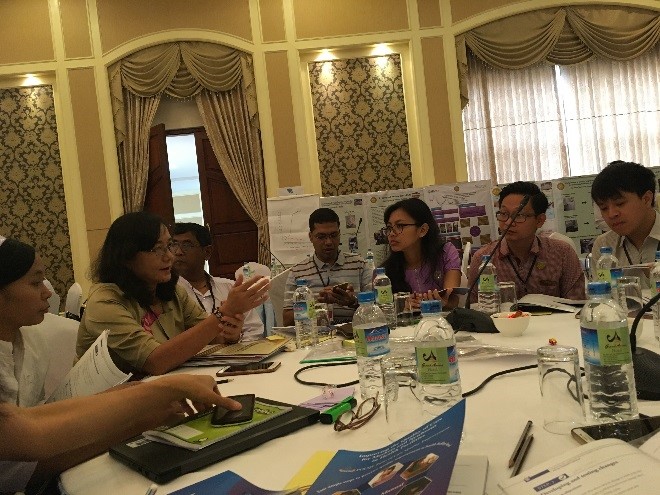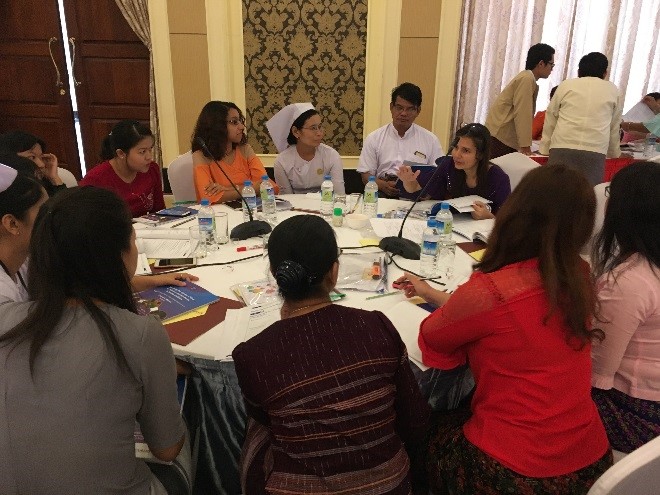BUILDING LEADERSHIP COMMITMENT FOR QUALITY IMPROVEMENT
Myanmar participated in SEA Regional Quality Improvement Workshops
- In May 2016, the WHO SEARO organized the first Regional Workshop for Improving Quality of Hospital Care for Maternal and Newborn Health, in New Delhi, India. The aim of the workshop was to introduce Quality Improvement concepts and enable participants to use the methodology in their hospitals and health centres to improve quality of care (QoC) for mothers and newborns at the time of childbirth ultimately strengthen the national QoC mechanisms. Five health officials from the Ministry of Health and Sports (MoHS) Myanmar participated, including: medical superintendents, obstetrics and gynecologists, and pediatricians from three States and Regional hospitals. The country team prepared action plan for establishing and scaling up the national mechanisms for improvement of QoC for mothers, newborns and children.
- As a result of the follow up actions of the workshop, the Taunggyi Hospital has successfully implemented a QI project and served as one of the QI champions in SEAR.
- During 6-8 February 2017, with support of WHO SEAR, the WHO Collaborating Centre (WHOCC) for Human Reproduction and WHOCC for Training and Research in Newborn Care, All India Institute of Medical Sciences (AIIMS) organized the Regional TOT on Quality Improvement for maternal and newborn health in New Delhi India. The main objective is to build the capacity of hospital/health facility teams, in scaling up and institutionalization of QI for maternal-newborn health in the countries. Four health officials from the MoHS Myanmar participated, including: Director Child Health Development, from Department of Public Health, obstetrics and gynecologists, and pediatricians from Taunggyi Hospital and Central Women Hospital.
BUILDING SKILLS FOR QUALITY IMPROVEMENT
National Training of Trainer Workshop on Quality Improvement
Being one of the action points of the regional workshops, a central level training of trainer workshop for QI was conducted during 28-30 March 2018 in Nay Pyi Taw to train the hospital teams from eight states and regions hospitals. A simple four steps approach for QI was introduced (Point of Care Quality Improvement Model – POCQI).
At the end of the TOT, each hospital team identified a QI project to be implemented at their respective hospitals. A virtual QI coaching network was established in collaboration with MoHS, WHO SEARO, WHO Myanmar and UNICEF. Implementation of QI projects have been monitored and technically supported via the network.



SHARING QUALITY IMPROVEMENT EXPERIENCES & LEARNING
Review Meeting – December 2018
After the implementation of QI projects by the hospital teams from eight states and regions, a review meeting was conducted on 20 December 2018, to present the results of the projects and to prepare hospital teams for next QI projects. Facilitators were central CHD and MRH Division and POCQI master trainers from Yankin Children Hospital and Dawei Hospital. Obstetricians, neonatologist/pediatricians, medical superintendents, nurses from eight states and region hospitals who have attended the TOT workshop, and Maternal and Child Health Medical Officers from those states and regions, WHO and partners working on QI initiatives in those areas (Access to Health Fund, USAID, Jhpiego, etc.).
The meeting was opened by opening speech of Deputy Director General, Department of Public Health. Experiences for QI and Point of Care Quality Improvement Model (POCQI) was shared by Dr Zaw Win Moe, Senior Consultant Neonatologist, Neonatal Intensive Care Unit, Yankin Children Hospital, Yangon.
After that, hospital teams from 8 states and regional hospitals who were trained at the TOT in March 2018 gave presentations of their implemented QI projects with results and lessons learned. New QI project planned were also presented.
Webinar presentation for regional learning
Myanmar also shared their progress in applying QI methods to improve MNCH care in the SEAR inter-country webinars. (August 2019)
| Facility Name | Title | Video/Slides |
|---|---|---|
| Taunggyi Hospital | Improving the Quality of Essential Newborn Care in Myanmar: The journey from one hospital to many. | Video: Webinar 3 of 3rd August 2018 Slides: Webinar Myanmar ENC QI 3rd August 2018 pdf |
LIST OF QI PROJECTS UNDERTAKEN BY TEAMS IN THE COUNTRY:
| S.No. | Name of health facility | Aim statement | Status |
|---|---|---|---|
| 1 | Taunggyi Hospital | To promote pantograph use – within 3 months (from 18% to 60%) | Results : increased to 91% |
| 2 | Lashio Hospital | To improve use of pantograph from 30% to 80% in 3 months | Results: Reached 97% |
| 3 | Lashio Hospital | To increase the practice of KMC from 30% to 90% in 3 months | Ongoing |
| 4 | Pathein Hospital | To improve early initiation of breast feeding from 41.7% to 80% within 6 weeks | Results: 82.9% |
| 5 | Pathein Hospital | To improve KMC | Ongoing |
| 6 | Dawei Hospital | To increase the use of clean delivery techniques (clean delivery surface) in labor room from 30% to 70% within 8 weeks | Results: More than 90% |
| 7 | Dawei Hospital | To improve skin to skin contact from 10% to 50% with 8 weeks among vaginal deliveries | Ongoing |
| 8 | Dawei Hospital | To improve hand hygiene practice (hand wash, hand rub before handling newborn, hand rub before changing to another newborn) among health care providers in ICU of newborn from 61% to 100% within 6 weeks | 100% at the end of six weeks |
| 9 | Dawei Hospital | To expand hand hygiene practices in every touch of newborn (ICU, phototherapy room, neonatal ward, admission, etc. | Ongoing |
| 10 | Sittwe Hospital | To improve hand hygiene practice in OG and neonate wards before touching neonates from 30% to 90% within 8 weeks | Ongoing |
| 11 | Magwe Hospital | To improve manual expression of breast milk in postnatal mother (neonatal unit) within 6-8 weeks | Ongoing |
| 12 | Bago Hospital | To improve hand washing practice in neonate ward from 50% to 80% within 8 weeks | Ongoing |
| 13 | Naypyitaw Children Hospital | To improve temperature measurement of neonates from 65% to 90% with 4 weeks | Ongoing |



